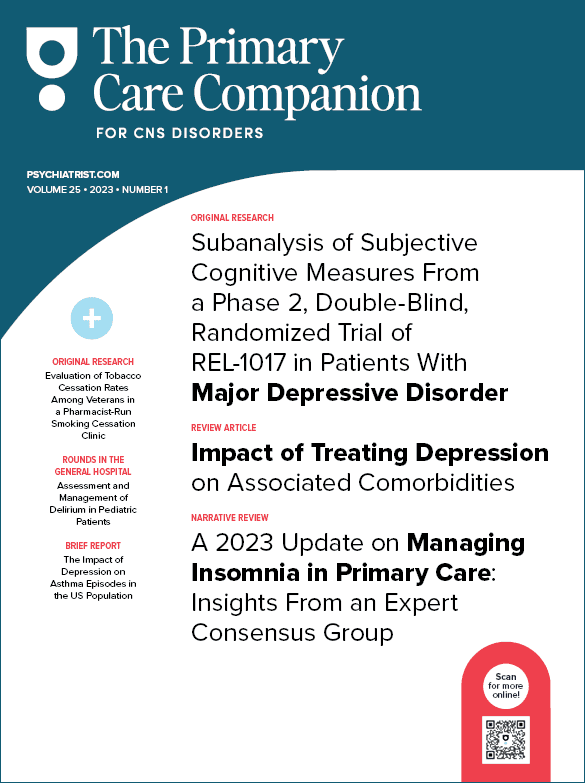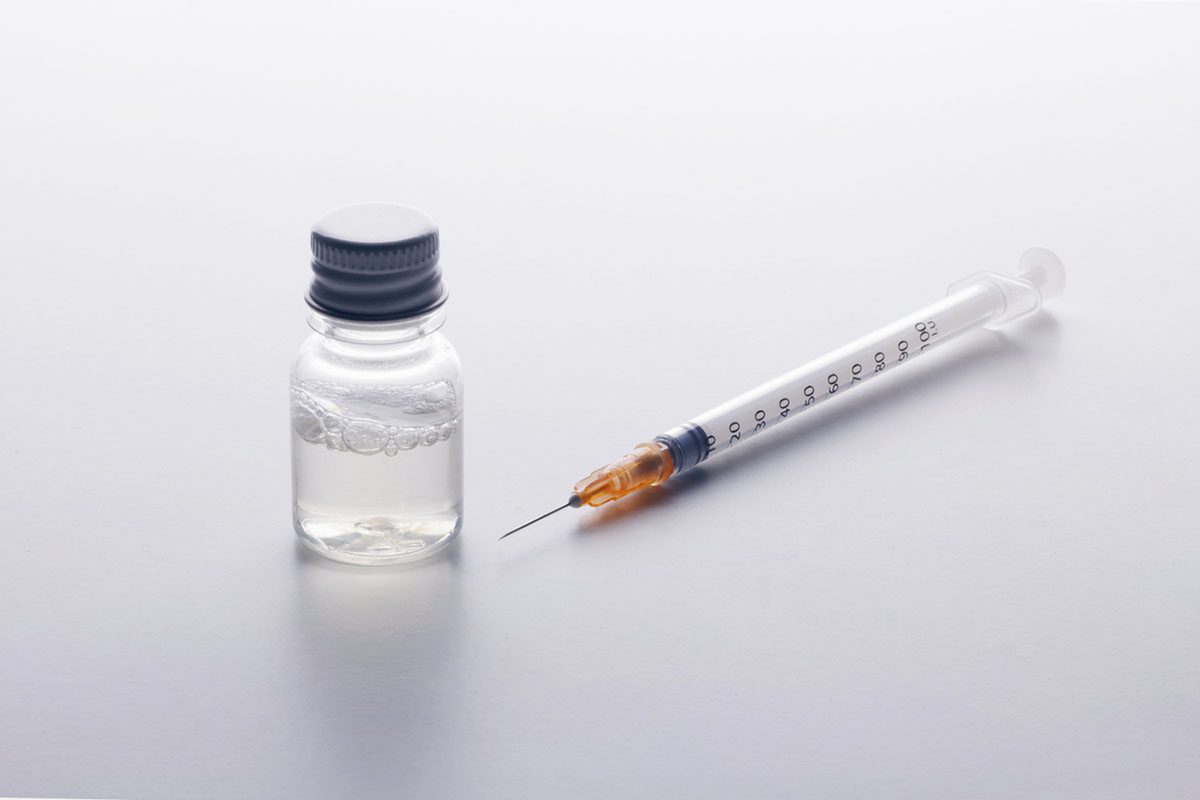Because this piece does not have an abstract, we have provided for your benefit the first 3 sentences of the full text.
To the Editor: Aripiprazole is a second-generation antipsychotic medication that can be used in the management of major depression and other disorders that commonly arise during the postpartum period. Due to its partial agonistic action at the D2 receptor, aripiprazole has been used to treat hyperprolactinemia in patients on D2 antagonists. Higher doses of aripiprazole (15-30 mg) can decrease antipsychotic-induced hyperprolactinemia.
This work may not be copied, distributed, displayed, published, reproduced, transmitted, modified, posted, sold, licensed, or used for commercial purposes. By downloading this file, you are agreeing to the publisher’s Terms & Conditions.
A Case of Decreased Milk Production Associated With Aripiprazole
To the Editor: Aripiprazole is a second-generation antipsychotic medication that can be used in the management of major depression1 and other disorders that commonly arise during the postpartum period. Due to its partial agonistic action at the D2 receptor,2 aripiprazole has been used to treat hyperprolactinemia in patients on D2 antagonists. Higher doses of aripiprazole (15-30 mg) can decrease antipsychotic-induced hyperprolactinemia.3 Yasui-Furukori et al4 reported this effect with a low dose (3 mg/d) of aripiprazole, and the effect plateaued at doses beyond 6 mg/d.4 However, little is known about the effect of aripiprazole on milk production in lactating postpartum patients. This report is of unexpected decrease in milk production after initiation of aripiprazole, with restoration of milk production after discontinuation of the drug.
Case report. A 40-year-old African American mother of 4 presented to our partial hospital program 5 weeks postpartum reporting depression, mood swings, anxiety, and panic attacks. She also endorsed poor sleep, increased energy, and hyperverbal speech occurring a week prior to presentation. She had a history of anxiety. Several years ago, she had 5- to 7-day periods with little or no sleep, distractibility, increased energy, grandiosity, and risky behaviors including shoplifting; however, she was using alcohol, cocaine, marijuana, and diet and energy pills at that time.
Working diagnoses according to DSM-5 were unspecified bipolar disorder and generalized anxiety disorder with panic attacks. The patient was taking milk thistle and fenugreek supplements at the time of admission. Risperidone and hydroxyzine were recommended. The patient started hydroxyzine 50 mg but not risperidone due to concerns about sedation. She had no decrease in milk production when she was taking hydroxyzine alone for 3-5 days. Aripiprazole 5 mg was then added in lieu of risperidone. The patient reported decreased milk production after 5 days on both aripiprazole and hydroxyzine, to the point that she was forced to supplement with formula. Milk production normalized less than 9 days after stopping both hydroxyzine and aripiprazole. At follow-up, other medication options were discussed; she elected not to use psychotropics. She continued the milk thistle and fenugreek supplements.
The adverse event of decreased milk production appeared after aripiprazole was administered, and it improved when the drug was discontinued (Naranjo Scale score of 2).5 While we are unaware of any published reports of hydroxyzine’s suppressing lactation, anticholinergic medications may decrease lactation. Mendhekar et al6 describe a case of aripiprazole-induced lactation suppression. There is a potentially conflicting report7 of aripiprazole-induced hyperprolactinemia and galactorrhea in a young nonlactating female. Psychogenic factors might also affect milk production.
The present case suggests aripiprazole may possibly decrease milk production in lactating women. This factor could be important in informed consent discussions when considering aripiprazole for nursing mothers.
References
1. Casey DE, Laubmeier KK, Eudicone JM, et al. Response and remission rates with adjunctive aripiprazole in patients with major depressive disorder who exhibit minimal or no improvement on antidepressant monotherapy. Int J Clin Pract. 2014;68(11):1301-1308. PubMed CrossRef
2. Burris KD, Molski TF, Xu C, et al. Aripiprazole, a novel antipsychotic, is a high-affinity partial agonist at human dopamine D2 receptors. J Pharmacol Exp Ther. 2002;302(1):381-389. PubMed CrossRef
3. Shim J-C, Shin J-GK, Kelly DL, et al. Adjunctive treatment with a dopamine partial agonist, aripiprazole, for antipsychotic-induced hyperprolactinemia: a placebo-controlled trial. Am J Psychiatry. 2007;164(9):1404-1410. PubMed CrossRef
4. Yasui-Furukori N, Furukori H, Sugawara N, et al. Dose-dependent effects of adjunctive treatment with aripiprazole on hyperprolactinemia induced by risperidone in female patients with schizophrenia. J Clin Psychopharmacol. 2010;30(5):596-599. PubMed CrossRef
5. Naranjo CA, Busto U, Sellers EM, et al. A method for estimating the probability of adverse drug reactions. Clin Pharmacol Ther. 1981;30(2):239-245. PubMed CrossRef
6. Mendhekar DN, Sunder KR, Andrade C. Aripiprazole use in a pregnant schizoaffective woman. Bipolar Disord. 2006;8(3):299-300. PubMed CrossRef
7. Joseph SP. Aripiprazole-induced hyperprolactinemia in a young female with delusional disorder. Indian J Psychol Med. 2016;38(3):260-262. PubMed CrossRef
aDepartment of Psychiatry, Pine Rest Christian Mental Health Services, Grand Rapids, Michigan
bUniversity of Detroit Mercy, College of Health Professions, Detroit, Michigan
Potential conflicts of interest: None.
Funding/support: None.
Patient consent: Consent was received from the patient to publish this case report, and information has been de-identified to protect anonymity.
Published online: November 29, 2018.
Prim Care Companion CNS Disord 2018;20(6):18l02303
To cite: Yskes R, Thomas R, Nagalla M-L. A case of decreased milk production associated with aripiprazole. Prim Care Companion CNS Disord. 2018;20(6):18l02303.
To share: https://doi.org/10.4088/PCC.18l02303
© Copyright 2018 Physicians Postgraduate Press, Inc.
Save
Cite
Advertisement
GAM ID: sidebar-top




